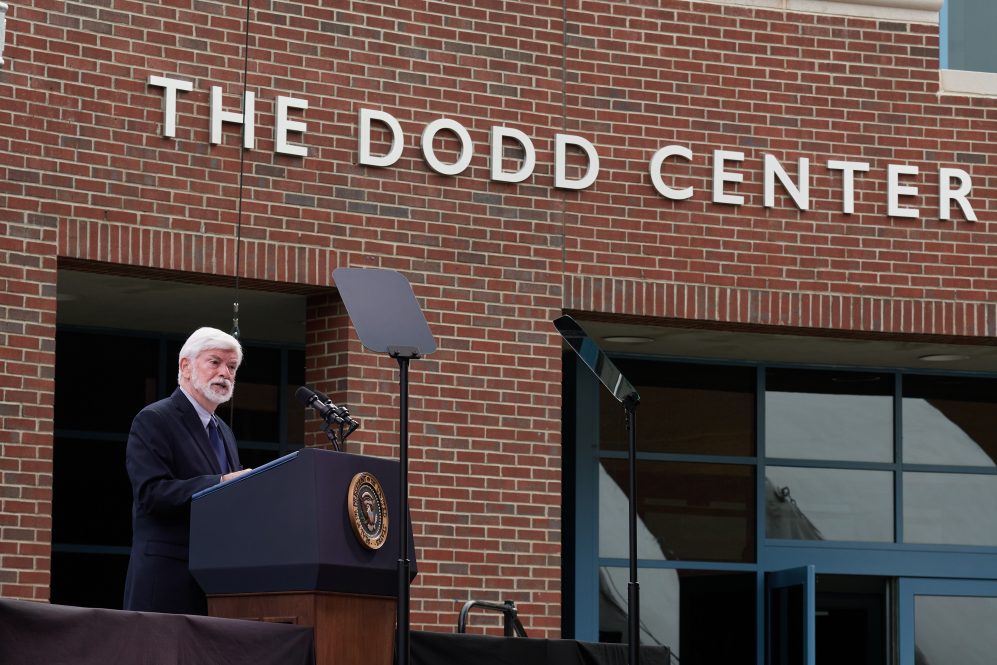On the eve of International Human Rights Day, observed annually on Dec. 10, the UConn Foundation announced that its Dodd Human Rights Impact Campaign has raised more than $12.5 million, further solidifying the reputation of UConn as a preeminent academic institution for the study of, engagement with, and practice of human rights. One hundred generous donors contributed to the campaign, including lead donor Bank of America.
“These gifts come at a critical time in the worldwide fight for justice and human rights,” says UConn President Radenka Maric. “The Dodd Center and this support are vital in helping us to fulfill our commitment to educating and preparing the next generation of human rights leaders who will enact positive change in our communities and across the globe.”
The money raised for Dodd Impact, the outreach and external programming arm of UConn’s Human Rights Institute (HRI), supports interdisciplinary inquiry into the most pressing human rights questions and prepares the next generation of human rights advocates across a range of fields. The success of the campaign also generated funds for two endowed chairs: the Christopher J. Dodd Chair in Human Rights Practice and the Wiktor Osiatyński Chair in Human Rights.
The Dodd Center for Human Rights, which houses the HRI, celebrates the life and legacy of Senator Thomas J. Dodd and Senator Christopher J. Dodd, who served a combined five decades in the U.S. House of Representatives and U.S. Senate representing Connecticut. Prior to his election to Congress, Thomas Dodd was the Nuremberg International Military Tribunal executive trial counsel following World War II.
“My father wanted not only his generation but future generations to never forget what happened [during the Holocaust] and to use it as an example of what happens when we abandon democracy, the rule of law, and justice,” said Senator Christopher Dodd of the importance of studying human rights. “I am hopeful in the years ahead we will examine issues that deserve to be focused on around the world and here at home.”
Dodd shared these remarks on the UConn campus on Dec. 8 during a conversation with Senator Chris Murphy, who joined virtually from Washington, D.C. The conversation, moderated by UConn President Emeritus Susan Herbst, was focused on “Civic Engagement: Our Collective Responsibility to Participate in Democracy,” and was made possible by a gift from Travelers. The campaign will fund several core Dodd Impact programs:
- The Dodd Endowment, supported in part by Bank of America, will fund priority needs of the Dodd human rights outreach programs including, but not limited to religious intolerance and the legacy of the Nuremburg Trials and the Holocaust. Funds raised for the Dodd Endowment also will support its pillar programs on Human Rights Education, Democracy and Dialogues, Business and Human Rights, and Human Rights Film and Digital Media.
- The Human Rights Close to Home Initiative engages educators and youth in the development and implementation of human rights and civics education in Connecticut.
- The Human Rights Summit, planned for Fall 2023, will fill the pressing need for more open dialogue, cross-sector collaboration, and innovation in the field of human rights. Over several days, participants will learn about the latest research, listen to powerful voices from practitioners on the front lines, and develop new strategies to advance human rights locally and around the world.
- Lectures, workshops, and symposia will advance understanding of human rights in this part of the Middle East and North Africa. An example of this work is the “Multicultural Aleppo Project,” which draws researchers, advocates, and Syrians from Aleppo together to design a virtual reality, immersive experience of everyday life in several neighborhoods.



